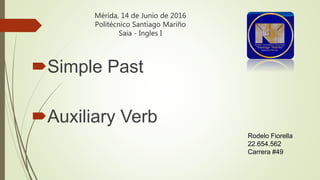Simple past and Auxiliary Verb
•Descargar como PPTX, PDF•
2 recomendaciones•592 vistas
Mapa Conceptual
Denunciar
Compartir
Denunciar
Compartir

Recomendados
Recomendados
Más contenido relacionado
La actualidad más candente
La actualidad más candente (20)
Destacado
Destacado (20)
Culture and Methods: How things don’t quite work at Spotify and how we’re tr...

Culture and Methods: How things don’t quite work at Spotify and how we’re tr...
Chris Farrell The role of the teacher in the modern classroom

Chris Farrell The role of the teacher in the modern classroom
Similar a Simple past and Auxiliary Verb
Similar a Simple past and Auxiliary Verb (20)
subject and verb agreement in grammar and technical writing

subject and verb agreement in grammar and technical writing
Último
APM Welcome, APM North West Network Conference, Synergies Across Sectors

APM Welcome, APM North West Network Conference, Synergies Across SectorsAssociation for Project Management
Último (20)
Ecosystem Interactions Class Discussion Presentation in Blue Green Lined Styl...

Ecosystem Interactions Class Discussion Presentation in Blue Green Lined Styl...
The byproduct of sericulture in different industries.pptx

The byproduct of sericulture in different industries.pptx
Separation of Lanthanides/ Lanthanides and Actinides

Separation of Lanthanides/ Lanthanides and Actinides
Web & Social Media Analytics Previous Year Question Paper.pdf

Web & Social Media Analytics Previous Year Question Paper.pdf
APM Welcome, APM North West Network Conference, Synergies Across Sectors

APM Welcome, APM North West Network Conference, Synergies Across Sectors
A Critique of the Proposed National Education Policy Reform

A Critique of the Proposed National Education Policy Reform
BAG TECHNIQUE Bag technique-a tool making use of public health bag through wh...

BAG TECHNIQUE Bag technique-a tool making use of public health bag through wh...
Simple past and Auxiliary Verb
- 1. Mérida, 14 de Junio de 2016 Politécnico Santiago Mariño Saia - Ingles I Simple Past Auxiliary Verb Rodelo Fiorella 22.654.562 Carrera #49
- 2. Simple Past Tense The main rule is that for every verb in English, there is only one form of it in the past tense. The past tense of the verb want is wanted subjects/pronouns: •I wanted •You wanted •He wanted •She wanted •It wanted •We wanted •They wanted Form of Simple Past The simple past expresses an action in the past taking place once, never, several times. It can also be used for actions taking place one after another or in the middle of another action. Affirmative: Yes, I spoke Negative: I did not speak Interrogative: Did I speak Exceptions in spelling when adding “ed” words that end with “e” only add a “d” words that end with "Y" after a consonant becomes “I” If a verb ends in consonant- vowel- consonant and the last syllable of the word is the strong one, have to use the last letter before add an suffix to the word “ing” or “ed” Love/loved Hurry/hurried Admit/admitted travel/travelled
- 3. Auxiliary Verb Auxiliary verbs are sometimes called helping verbs because they are needed to form many of the tenses The most used auxiliary verbs are the verbs: Be Do Have the auxiliary to do is needed to ask questions in the present and past simple tenses To be is needed for the present and past continuous, and all the passive forms The auxiliary to have is used in the present and past perfect tenses Regular verbs:Those verbs that form their past participle with ‘d’ or ‘ed’ are regular verbs. These verbs do not undergo substantial changes If the verb ends with a vowel, only ‘d’ is added. Example: Share/Shared If the verb ends with a consonant, ‘ed’ is added. Example: Want/Wanted Irregular verbs: Those verbs that undergo substantial changes when changing forms between tenses are irregular verbs. The changed forms of these verbs are often unrecognisably different from the originals Example Go/Went Affirmative: Yes, I worked / You worked Negative: I did not play/ You did not play Interrogative: Did I work? / Did you work?